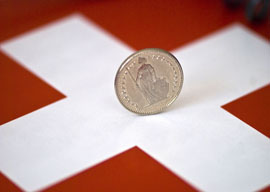
September 13, 2011

On Lake Geneva I float, looking at France across the water, where the grass is not greener but the prices are much lower.
I don’t know how it works exactly, but I gather it has something to do with floating exchange rates: Things being unstable everywhere else, traders rush to buy some steady old Swiss francs and the price of bread goes up at the Migros supermarket.
Looking across, one can’t help but compare, just as looking up one tends to envy and looking down to pity—a nicer feeling, though not to be confused with rectitude.
Across is France where life is cheaper, below the murky depths, and above the Alps, where a young Hegel went walking over two hundred years ago.
As he noted in his diary, he had a nice holiday though his feet were blistered and the mountains underwhelmed him:
The sight of these eternally dead masses provokes nothing in me but the uniform and at length boring idea: it is.
Having read Rousseau, he’d expected so much more. Rousseau exulted about the Alps:
Meditations here take on a certain grand and sublime character, proportionate to the objects that strike us, a certain tranquil voluptuousness that has nothing acrid or sensual. It seems that in elevating oneself above the sojourn of men, we leave behind all low and earthly sentiments, and that in measure as we approach the ethereal regions, the soul catches some of their inalterable purity.
Rousseau peopled this exhilarating air—in which it was impossible to sin—with peasants so honest and innocent that they didn’t even put a price on their bread and cheese, enjoining the traveler to name his own.
Hegel discovered they didn’t put a price on things because they thought they could get more from the tourists that way. If you gave them less than market price they complained; if you gave them just the right amount, they left without a “thank you” or “farewell.” Only if you overpaid did they smile with sweet peasant innocence.
No pure primitives for Hegel then, just calculating Oberlanders. No inspiring nature, just brute matter and cold necessity: It is, nothing more to be said.
In one trip he killed two birds: nature and the noble savage. To make up for it, he invented history.
Just as Rousseau had taken these valleys—which until then had been considered hideous, almost evil, an obstacle to be traversed on the way to Italy—and filled them with his rich fancy, inventing the Alps.
If men have invented such grand things as the Alps and history, think of what else they could come up with!
I left the lake, its surface wavily reflecting the mountains like a Hodler painting, and a lyric of Hölderlin’s echoing in my water-filled ears:
…man knows
Much that is good; but astonished as the animals
He looks toward heaven….
Toward heaven I headed, in the Montreux-Berner Oberland train.